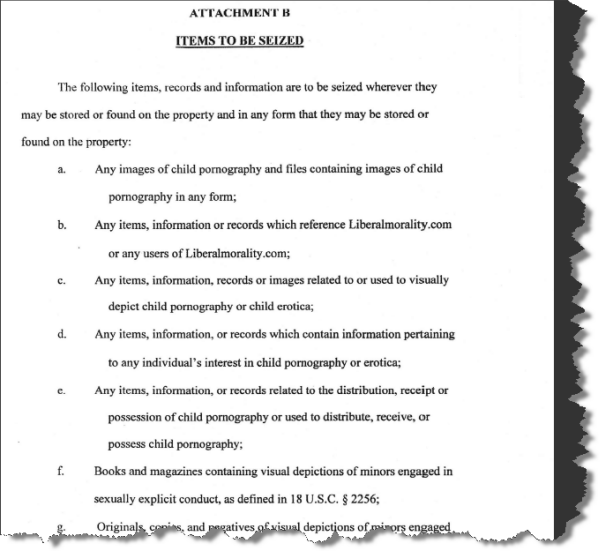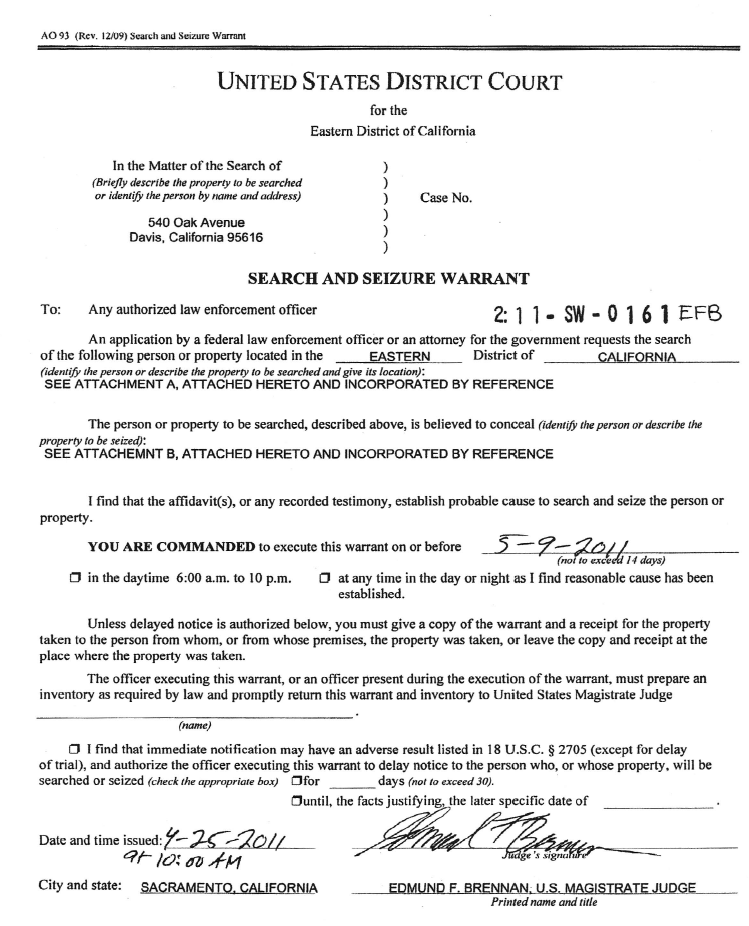
“I have had no contact with them since [the incident],” Linda Clark told the Vanguard in a Thursday interview at her Davis home. “Apparently they are aware of my complaint… and [according to News 10] it’s being investigated. But nobody has contacted me.”
Incidents like this simply shock the sensibilities of a community that has been conditioned to believe these kinds of things happen in other places.
“I don’t think this is the type of thing anyone expects to take place in Davis,” Ms. Clark added.
As we reported last week, Ms. Clark was stunned to find, in the early morning hours of April 26, federal officials from Immigration and Customs Enforcement had entered the property that she owns, which is next to her current residence on Oak Ave.
 She wrote in her Davis Enterprise Op-Ed, “The incident described above occurred in a quiet, family-oriented neighborhood right here in Davis. Most residents of the house are either visiting international scholars or students, or American citizens who are students. No drug dealers. No ‘illegal immigrants.’ “
She wrote in her Davis Enterprise Op-Ed, “The incident described above occurred in a quiet, family-oriented neighborhood right here in Davis. Most residents of the house are either visiting international scholars or students, or American citizens who are students. No drug dealers. No ‘illegal immigrants.’ “
She continued, “No one offered the slightest resistance, unless cowering in fear or closing a door for protection from an as-yet-unidentified police officer who is presumed to be a robber constitutes ‘resistance.’ No one has been arrested or charged with any crime.”
Ms. Clark told the Vanguard on Thursday that since writing the Davis Enterprise Op-ed she has talked to a lot of supportive people, but has not learned anything new.
She has two primary concerns, first the amount of force she found to be excessive, especially in the way that it terrified her tenants. She was also concerned that most never even saw the search warrant before the ICE officials left.
“They terrified some of the tenants, especially ones whose English is not very good,” she said.
She said that many did not even realize it was the “police” who had entered the residence, at first. Many of her tenants were foreign nationals and not primarily English speakers, they thought the place was being raided by burglars and terrorists.
According to her neighbor, she said they banged on the door and did yell police and warrant, however, clearly, not everyone inside understood what was going on.
“Some of the tenants thought that they were either being burglarized or they were terrorists trying to break in,” she said.
“Most of the people in the house never saw the search warrant,” she added. “A couple of people were told that there was a search warrant. The Vietnamese man or the couple from Chile had no understanding of what was going on or why people were rifling through their stuff.”
She and her son were eventually shown the search warrant, but this was well after officials had entered the place.
“I saw the search warrant somewhere in the middle of things, I was not aware that they had already searched through a lot of things and that they had everybody inside handcuffed,” she said and then added, “I did know that they had gone inside with their guns drawn, because my neighbors told me that.”
Linda Clark estimates that her place suffered several thousands of dollars in damages, including the unnecessary breaking in of internal doors. She has not been compensated for the damage nor have ICE officials made contact with her since the event.
“They broke the lock on the master bedroom door to get into that bedroom. That’s the room where two Vietnamese women were in,” she said. “They were terrified and hiding. They weren’t about to open the door, so they broke the lock to get in.”
They battered to pieces at least two other doors and dropped the battering ram on the floor causing a dent there. They battered a door to pieces, and it was a sliding door that locked on the side that they were on.
“The occupant of the room said they kind of threw things aside and took the battering ram through it,” she added.
She described that there was an outside door there, with another tenant on the ground with an agent holding a gun on him. Given that, she said, “I have no idea why they needed to batter that door down.”
“They could have gone around, there was at least one agent outside,” she added.
Not only did they not compensate her for the damages, “They didn’t even mention the damages to me,” she said. “They casually said to the occupant of that room that the landlady would take care of fixing the door.”
“I have had no acknowledgment of any damages,” she said but added, “That’s really the least of my concerns. It annoys me because it just adds to the amount of violence, that’s my concern. The kind of callous disregard for the people, the property, it’s all under one sort of heading.”
As she said, that is not her primary concern, as outlined in the complaint she has filed to ICE.
She wrote, “I think the ICE agents used excessive force while executing this warrant. They announced their presence in a manner that terrified those residents who could hear them yelling and banging on the door but who were unable to understand what was being said and by whom. Some of the residents thought they were robbers or perhaps terrorists.”
“Agents entered the house with guns drawn with neither the consent of the residents nor any cognizance on their part that the people invading their home were federal agents serving a search warrant. With a seemingly callous disregard for the physical and psychological safety of innocent, frightened people, agents at gun point forcibly detained and handcuffed unresisting persons, several of whom did not understand they were police agents,” she continued.
The justification for this use of force was ostensibly the safety of the officers and the tenants, despite the fact that all they were looking for was porn on a computer.
“Apparently their rationale is that it was for both the safety of the tenants and the safety of the officers,” Ms. Clark responded. “I didn’t know that this had gone on until 4:30 in the day.”
The Vanguard has acquired a copy of the warrant.
In the warrant is listed requests for “records and information” which include “any images of child pornography and files containing images of child pornography in any form” among other derivations there of. There is no individual named in the warrant.

In her complaint, she writes, “Upon talking with an agent, outside of the house after identifying myself and being shown the warrant, I was led to believe they were looking for a computer and other information that may or may not have once been in the house, may or may not still have been in the house, and that was allegedly involved in the transmission of and/or used to visit a site involved in child pornography in March of last year.”
From the warrant, she was able to infer that they were looking for a particular individual who had apparently accessed a child porn site in March of 2010. “They were certainly referencing something that happened in that March,” she told the Vanguard on Thursday.
The question became, why would they be serving a warrant on an individual who accessed a child porn site over a year ago? Ms. Clark speculated this was part of an increased federal effort to crack down on child pornography. “Because [child porn rings] are international and cross international borders, ICE gets involved,” Ms. Clark said. “I’m all in favor of that, I have my own personal reasons for [going after] child porn rings, kiddy porn.”
“I have no objections to them going after child pornographers,” she said. “I have no objection to them searching the house, they had a legal search warrant.”
I simply object to the excessive amount of force and that fact that some of the people didn’t know even after they left that they had a search warrant,” she said. “That bothers me.”
As she said, “My grandson [who was one of the residents in the house] said, you don’t ask if someone has a search warrant or if you can see a search warrant when they’re pointing a gun at you.”
The bottom line for her is a due process question.
“My question has to due with the due process aspect, do they really have the right to search without people really knowing and seeing that there’s a search warrant?” she said. “How much of that has been eroded by the Patriot Act? In which case, our elected officials should be doing something to rescind that.”
“I’m not holding my breath,” she added.
—David M. Greenwald reporting


Despite the repetition of the same story from a single and subjective source, we should be prudent in rendering judgments similar to the complainant until more information can be received from other informed sources.
With that qualification–and taking the story at face value for the sake of discussion only–how is it that the Immigration and Customs Enforcement people are enforcing child porn laws? There has to be a whole lot more to this story because the dots sure don’t line up very well right now.
Answered my own question. ICE is one of four designated federal law enforcement agencies charged with enforcement of child porn laws.
http://www.reginfo.gov/public/do/eAgendaViewRule?pubId=201010&RIN=1105-AB32
The allegation in the warrant is that this guy visited a website called liberalmorality.com. Going to a website is a crime? Pardon my ignorance, but I thought someone had to do something more active than that.
I recall the case of the guy on KGO radio–can’t recall his name–who was arrested and later convicted for child porn because he downloaded a depiction of child porn and then emailed that picture to someone. Whether that should be a crime or not–I don’t know enough details of his case to say–at least that is an active process. He had to download the picture, capture it on his computer and then email it to someone else.
In what seems to be alleged here, the person merely went to a website and nothing more. I have never seen a child porn website, but I have gone to a host of strange websites by mistake. I once was looking for a woodworking tool–I needed a convex-sole plane–Googled it, and found a bunch of sellers. Unfortunately, one of the companies selling “wood tools” was a gay porn site. Thankfully no one arrested me for checking out those tools.
In this case, a person could have intended to go to liberalmortality.com and missed one letter and ended up at liberalmorality.com, the site in question. Or maybe he was a fan of the Daily Kos website and his intent was to read this article ([url]http://www.dailykos.com/story/2005/02/17/93322/-Liberal-Morality[/url])?
It’s hard for me to believe that we have decided that merely looking at a website is a crime. I cannot even think who this alleged criminal’s victim would be. I certainly can understand prosecuting a person who makes a website depicting children in this way. I can understand prosecuting the adults who take the pictures, distribute them or advertise them to others. But going to a website is itself a crime? Doesn’t make any sense to me.
[quote]Despite the repetition of the same story from a single and subjective source, we should be prudent in rendering judgments similar to the complainant until more information can be received from other informd sources. [/quote]
Nicely said.
[quote]The allegation in the warrant is that this guy visited a website called liberalmorality.com. Going to a website is a crime? Pardon my ignorance, but I thought someone had to do something more active than that. [/quote]
If you look at the attachment, under item “e” it refers to “used to distribute”, which indicates there is the possibility the computer in question may have been used to DISTRIBUTE child pornography. That goes way beyond just visiting a site.
I do get your point about inadvertantly stumbling onto an inappropriate site. Somehow I doubt visiting a child porn site one time would be considered a crime.
In fact there was a case of a retired school bus driver who did something similar, whose curiousity got the better of him and he checked out a child porn site. What he didn’t know is that it was a sting operation by a law enforcement agency. The agency emailed the bus driver back, luring him to the site again and again, then enticed him into buying child porn. This happened around the time when the Internet first came into being and people were considerably more naive. The bus driver was curious what this whole thing was about, so went ahead and ordered one item. Then voila, he was suddenly arrested for “possession of child porn”. To make a long story short, this case stood for the proposition that police cannot create the desire for child pornography – it was a clear case of police entrapment. But for the police planting the idea, enticing further exploration, the bus driver never would have been sucked into this crime. Oh, did I mention, the bus driver never had so much as a speeding ticket on his record?
[quote]Not only did they not compensate her for the damages, “They didn’t even mention the damages to me,” she said. “They casually said to the occupant of that room that the landlady would take care of fixing the door.”[/quote]
Now this is an interesting question – whether the owner can get reimbursement for the damages to the premises, especially in light of the fact ICE got nothing in the way of evidence. Off hand I would say the landlady’s homeowners’ insurance would probably cover the damage; and if not she can file a civil suit against ICE for the damages. IF the amount is under $7500, the owner could possibly sue in small claims court, which would be very interesting. I wonder if ICE would even bother showing up?
Somewhat related case, raiding Stockton home without clear reason why:
Questions surround feds’ raid of Stockton home
[url]http://www.news10.net/news/local/story.aspx?storyid=141108[/url]
Rich: That is an interesting point, obviously they were looking for more than just accessing the website as the warrant has a lengthy list. But that access to a site is sufficient for a warrant to be issued is a little scary given the possibilities of accidental log in to an innocuous sounding site.
Phil: You may have noticed I asked Ms. Clark about ICE and child porn and her response.
Check out the following website:
http://news.cnet.com/8301-13578_3-9899151-38.html
This is a direct quote from there: “While it might seem that merely clicking on a link wouldn’t be enough to justify a search warrant, courts have ruled otherwise. On March 6, U.S. District Judge Roger Hunt in Nevada agreed with a magistrate judge that the hyperlink-sting operation constituted sufficient probable cause to justify giving the FBI its search warrant.
The defendant in that case, Travis Carter, suggested that any of the neighbors could be using his wireless network. (The public defender’s office even sent out an investigator who confirmed that dozens of homes were within Wi-Fi range.)
But the magistrate judge ruled that even the possibilities of spoofing or other users of an open Wi-Fi connection “would not have negated a substantial basis for concluding that there was probable cause to believe that evidence of child pornography would be found on the premises to be searched.” Translated, that means the search warrant was valid.”
Unbeleivable!
Correction: Unbelievable!
Wow! I guess I need to be much more careful. As a gynecologist, I frequently just “Google” looking for answers to somewhat off beat questions asked by friends and family members when I do not think a literature search is warranted or will be useful.
At times, because of the nature of my specialty, this has led me to some questionable sites. In the past, I have considered this a trivial ” oops”
and hastily exited the site. Now, I am not so sure.
That’s scary.
Unfortunately, this type of incident is not as uncommon as one may expect. I was led to this site from the Huffington Press site.
http://reason.tv/video/show/tim-cavanaugh-discusses-swat-r
Think about it – if someone sends you an email, containing a link to a kiddie porn site with an innocuous sounding name, and you go ahead and click on that link… ICE could come knocking at your door… very scary…
To medwoman: It does make you rethink about how you “surf the net”, doesn’t it? Most of my research tends to be in the legal realm, so I have never stumbled on any questionable sites myself that I can think of, but I could see how it could very easily happen, especially in light of your profession as a gynecologist.
Hey, is there any way of turning on a computer filter that would guarantee not landing on a questionable site. Does anyone know if this is possible and how to do it?
So if my posts start coming from behind bars, will someone make sure I get bailed out ?
What is the word limit on comments?
MG
Not sure. You can always post your response in parts.
[quote]So if my posts start coming from behind bars, will someone make sure I get bailed out ?[/quote]
LOL – crying on the inside. What a sad state of affairs. Clearly we need a tweaking of the laws in this area…
E Musser–
“… ICE could come knocking at your door…”
From what I read about the incident; they won’t knock on your door
–instead they will ram down your door without warning at 3 AM; rampage thru the house causing expensive damage, and yell and point guns at you when they find you. You may not be permitted to talk or protest; and they may condescend to show you the search warrant at some point.
It seems to me such paramilitary tactics are over-the-top overkill for most situations; unless you are going after known violent felons or hard-core terrorists.
They need to gather more intelligence first; and tailor their raid tactics based on this intelligence; not use extreme paramilitary tactics for each search.
re: child porn, my own experience with this deplorable issue: if one accidentally stumbles upon a child porn website (do an internet searc of “spanking” or, “City of Berkeley anti-spanking ordinance”, for example), & you may find yourself on that type of website)
You must turn it over to the cops and risk 7 years conviction for being in possession of child porn. If you simply delete it, and are “caught” later, the judge may or may not show leniency. In the old days, prior to approximately 2005 or 2006 (an I.T. techie will have to help me here) there was no easy way to delete a file without first saving it to your hard drive or a 3X5 floppy disk, then delete. However, once you saved it, you were accused of saving child porn. Older judges in Solano Co. did not understand computers. (I don’t know if older judges in Yolo Co. had a better understanding I.T.) If, perhaps, one looked at the disgusting images and determined the disgusting images were adult bodies photo shopped with children’s faces, it did not matter. If the image was tat suntan lotion advertisement of the child’s bathing suit bottoms being tugged at by the dog on the beach, it does not matter. It is the same as actual porn images in the eyes of the law and should have been deleted, or turned over to law enforcement at the risk of going to state prison for seven years for being in possession of it. If one visited an adult-only advertied monitored website, Yahoo, for example: the monitoring they referred to was law enforcement monitoring, not Yahoo staff monitoring. The exact type of website one is trying to access to view perfectly legal adult porn could be the website that gets you in the most trouble.
Simple solution to all of this nightmare> do not visit any website ever to view adult porn. Beware, your pc can hold onto deleted files for seven or eight cycles after you believe you have deleted something. IT law enforcement folks can retrieve very old files you think you have deleted. Use duckduckgo to do searches, and buy a hard copy Penthouse instead.
Teach your teens to never ever view porn on their computers.
Thanks David . This case reminds me the child porn case from the UC Davis Medical Center covered up by the by UCDMC HR investigator and administration.